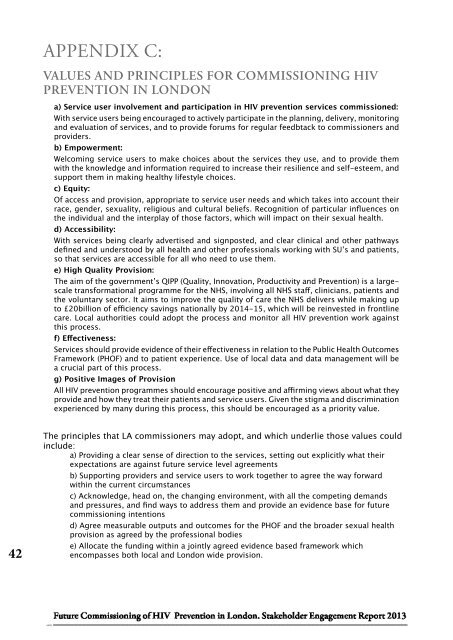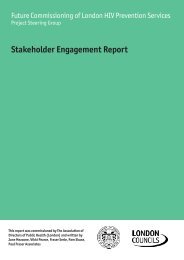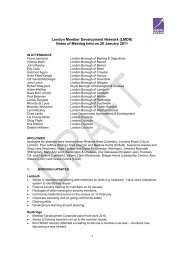Stakeholder Engagement Report - London Councils
Stakeholder Engagement Report - London Councils
Stakeholder Engagement Report - London Councils
Create successful ePaper yourself
Turn your PDF publications into a flip-book with our unique Google optimized e-Paper software.
Appendix C:<br />
Values and Principles for Commissioning HIV<br />
Prevention in <strong>London</strong><br />
a) Service user involvement and participation in HIV prevention services commissioned:<br />
With service users being encouraged to actively participate in the planning, delivery, monitoring<br />
and evaluation of services, and to provide forums for regular feedbtack to commissioners and<br />
providers.<br />
b) Empowerment:<br />
Welcoming service users to make choices about the services they use, and to provide them<br />
with the knowledge and information required to increase their resilience and self-esteem, and<br />
support them in making healthy lifestyle choices.<br />
c) Equity:<br />
Of access and provision, appropriate to service user needs and which takes into account their<br />
race, gender, sexuality, religious and cultural beliefs. Recognition of particular influences on<br />
the individual and the interplay of those factors, which will impact on their sexual health.<br />
d) Accessibility:<br />
With services being clearly advertised and signposted, and clear clinical and other pathways<br />
defined and understood by all health and other professionals working with SU’s and patients,<br />
so that services are accessible for all who need to use them.<br />
e) High Quality Provision:<br />
The aim of the government’s QIPP (Quality, Innovation, Productivity and Prevention) is a largescale<br />
transformational programme for the NHS, involving all NHS staff, clinicians, patients and<br />
the voluntary sector. It aims to improve the quality of care the NHS delivers while making up<br />
to £20billion of efficiency savings nationally by 2014-15, which will be reinvested in frontline<br />
care. Local authorities could adopt the process and monitor all HIV prevention work against<br />
this process.<br />
f) Effectiveness:<br />
Services should provide evidence of their effectiveness in relation to the Public Health Outcomes<br />
Framework (PHOF) and to patient experience. Use of local data and data management will be<br />
a crucial part of this process.<br />
g) Positive Images of Provision<br />
All HIV prevention programmes should encourage positive and affirming views about what they<br />
provide and how they treat their patients and service users. Given the stigma and discrimination<br />
experienced by many during this process, this should be encouraged as a priority value.<br />
42<br />
The principles that LA commissioners may adopt, and which underlie those values could<br />
include:<br />
a) Providing a clear sense of direction to the services, setting out explicitly what their<br />
expectations are against future service level agreements<br />
b) Supporting providers and service users to work together to agree the way forward<br />
within the current circumstances<br />
c) Acknowledge, head on, the changing environment, with all the competing demands<br />
and pressures, and find ways to address them and provide an evidence base for future<br />
commissioning intentions<br />
d) Agree measurable outputs and outcomes for the PHOF and the broader sexual health<br />
provision as agreed by the professional bodies<br />
e) Allocate the funding within a jointly agreed evidence based framework which<br />
encompasses both local and <strong>London</strong> wide provision.




